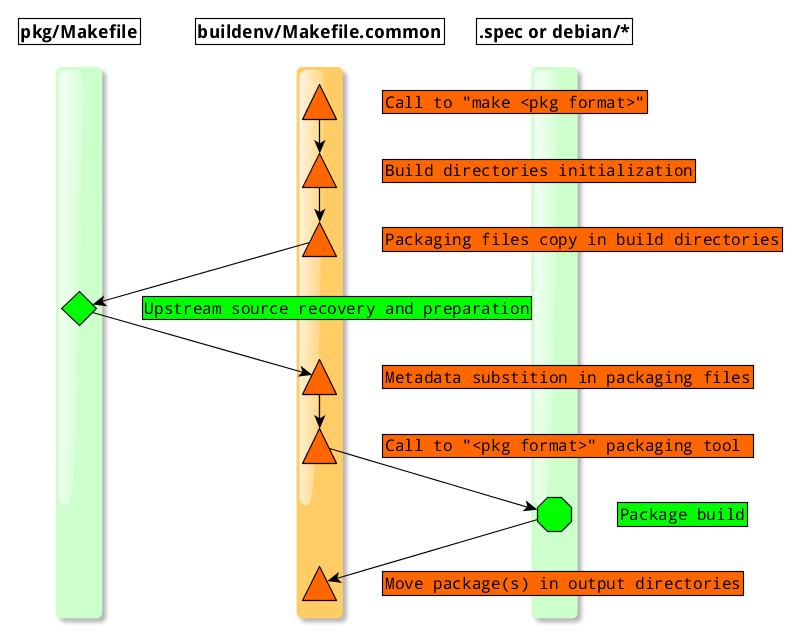Build a package¶
Here is the general building workflow:
- The steps in orange are common for all packages and must not be modified.
- The steps in green are package specific, it’s those steps which must be customized for each package.
Cleaning cache, out and src-out directories¶
Example with with package python-asciigraph:
# go inside the component directory
$ cd python-asciigraph
# clean everything
$ make clean
# clean, but keep upstream sources to avoid re-downloading them
$ make clean KEEP_CACHE=true
Build rpm package¶
Example with package python-asciigraph:
# go inside the component directory
$ cd python-asciigraph
# build rpm package
$ make rpm
Here are the results:
# output packages:
$ ls out/
python-asciigraph-1.1.3-1.kw+unk0.noarch.rpm
# output source package
$ ls src-out/
python-asciigraph-1.1.3-1.kw+unk0.src.rpm
Build rpm inside a clean chroot¶
# go inside the component directory
$ cd python-asciigraph
# Build the rpm in a chroot (using mockchain)
# Replace el7 by the dist version targeted
$ make rpm_chroot DIST=el7
Build deb package¶
Example with package python-asciigraph:
# go inside the component directory
$ cd python-asciigraph
# build deb package
$ make deb
Here are the results:
# output packages:
$ ls out/
python-asciigraph_1.1.3-1~kw+unk0_all.deb
# output source package
$ ls src-out/
python-asciigraph_1.1.3-1~kw+unk0.debian.tar.xz python-asciigraph_1.1.3-1~kw+unk0.dsc
python-asciigraph_1.1.3.orig.tar.gz
Build deb package inside a clean chroot¶
This build system can leverage cowbuilder from Debian to build in a clean chroot.
This is the recommended way to build packages targeted to be used in production.
Building in chroot is heavier but has multiple gains:
- It permits to build in a clean environment every time
- It rapidly exits in error if the build dependencies are not properly declared
- It permits to target different version of Debian (stretch, jessie, wheezy)
- It manages build dependencies, installing them automatically (if properly declared)
- It permits to avoid having to install all build dependencies on your main system
# go inside the component directory
$ cd python-asciigraph
# build deb package for dist jessie
$ make deb_chroot DIST=jessie
Chroot building tips¶
Common tips¶
Note
Building the chroot can be a long and heavy step but there are several way to accelerate it.
The first is to used a local mirror.
For deb/cowbuilder this can be done using the DEB_MIRROR option when calling deb_chroot:
$ make deb_chroot DIST=jessie DEB_MIRROR=http://your.local.mirror/debian
For rpm/mock, this can be done by changing the appropriate configuration file in /etc/mock
$ vim /etc/mock/epel-7-x86_64.cfg
The second is to use a tmpfs for building, it requires a few GB of RAM however (at least 2GB per distro version targeted, but this may vary depending on the number packages and the size of their dependencies):
For deb/cowbuilder:
# as root
$ mount -t tmpfs -o size=16G tmpfs /var/cache/pbuilder/
# in fstab
tmpfs /var/cache/pbuilder/ tmpfs defaults,size=16G 0 0
For rpm/mock:
# as root
$ mount -t tmpfs -o size=16G tmpfs /var/lib/mock
# in fstab
tmpfs /var/lib/mock tmpfs defaults,size=16G 0 0
Warning
Some recent distributions may disable the vsyscall syscall which is used by older libc (ex: CentOS/RHEL <= 6).
The problem can be diagnosed by running dmesg after a failure to create or run anything in the chroot. You would get errors like:
[ 578.456176] sh[15402]: vsyscall attempted with vsyscall=none ip:ffffffffff600400 cs:33 sp:7ffd469c5aa8 ax:ffffffffff600400 si:7ffd469c6f23 di:0
[ 578.456180] sh[15402]: segfault at ffffffffff600400 ip ffffffffff600400 sp 00007ffd469c5aa8 error 15
In most cases this syscall can be reenabled with vsyscall=emulate option in the kernel command line.
Deb/cowbuilder tips¶
Warning
Building in chroot requires root permission (it’s necessary for creating the chroot environment).
If make deb_chroot is run as a standard user, sudo will be used for cowbuilder calls.
If you want to avoid password promt, the only command that needs to be white listed in sudoers configuration is cowbuilder:
# replace build-user with the user used to generate the packages
build-user ALL=(ALL) NOPASSWD: /usr/sbin/cowbuilder
Warning
If there is an issue or when modifying the chroot (changing the mirror used for example), it may be necessary to removing an existing cowbuilder chroot.
For that, use the deb_get_chroot_path target:
# show the chroot path:
make deb_get_chroot_path DIST=<code name>
# as root
# remove the chroot
rm -rf `make deb_get_chroot_path DIST=<code name>`
Warning
To create the cowbuilder chroot, it’s required to have the GPG keys of the targeted DIST.
If you get errors like:
I: Checking Release signature
E: Release signed by unknown key (key id EF0F382A1A7B6500)
E: debootstrap failed
it means that you don’t have the required keys.
The debian-archive-keyring and ubuntu-archive-keyring packages provides these keys. However it might be necessary to use a newer keyring than the one available in your environment, specially if crossing from an old Ubuntu to a new Debian or an old Debian to a new Ubuntu.
For example, with Ubuntu Trusty (14.04), targeting Debian stretch, the following hack is necessary:
wget http://cz.archive.ubuntu.com/ubuntu/pool/universe/d/debian-archive-keyring/debian-archive-keyring_2017.5_all.deb \
&& sudo dpkg -i debian-archive-keyring_2017.5_all.deb
ls /etc/apt/trusted.gpg.d/
debian-archive-jessie-automatic.gpg debian-archive-stretch-security-automatic.gpg
debian-archive-jessie-security-automatic.gpg debian-archive-stretch-stable.gpg
debian-archive-jessie-stable.gpg debian-archive-wheezy-automatic.gpg
debian-archive-stretch-automatic.gpg debian-archive-wheezy-stable.gpg
It might also be necessary to pass additionnal parameters to make cowbuilder use this keyring:
make deb_chroot DIST=stretch COW_OPTS=--debootstrapopts=--keyring=/etc/apt/trusted.gpg.d/debian-archive-stretch-stable.gpg
Rpm/mock tips¶
Warning
To get the necessary permission to build a package using mock, a mock group must be present on the system.
And the user building packages must belong to this group.
# Replace USER_ID by the build user
groupadd mock
usermod -a -G mock USER_ID
Warning
In Debian/Ubuntu, mockchain may fail because /usr/bin/createrepo_c is not available, (Debian bug #875701).
A work around is to install the package createrepo and symlink /usr/bin/createrepo_c to /usr/bin/createrepo.
Also, the dependency python3-requests is missing, it’s necessary to install this package manually.
apt-get install createrepo python3-requests
ln -s /usr/bin/createrepo /usr/bin/createrepo_c
